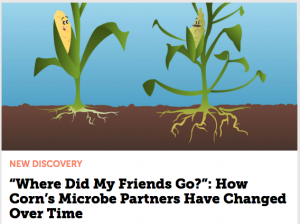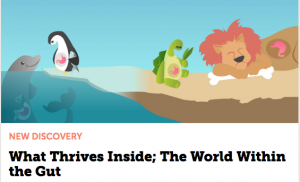Have you ever felt that your research could be a flagship educational tool, an engaging discovery tailor-made for the cover of a high school or even elementary school biology book? Well, thanks to the Understanding Biodiversity Section of Frontiers for Young Minds (FFYM) you have the chance to bring your science into the classroom; to provide every teacher across the country with your research in a format they can present to their eager students.
Frontiers for Young Minds is a non-profit, open-access scientific journal written by scientists for young people, but with an innovative twist: the kids themselves assume the role of “peer reviewer.” Distinguished scientists are invited to write about their cutting-edge discoveries in a language that is accessible for a young audience, and it is then up to the kids themselves – with the help of a science mentor – to critique the article and to explain to the authors how to improve the contribution before publication. Frontiers for Young Minds thus provides a collection of freely available scientific articles by distinguished scientists that are shaped for younger audiences by the input of their own young peers.
Frontiers for Young Minds was recognized as one of the American Library Association’s 2014 Great Websites for Kids, providing open access to real science for all classrooms. Last year, I joined the team of Chief Editors and helped initiate the section on Understanding Biodiversity. To date we have 8 articles that discuss principles of biodiversity science. Together with CSU-EB Assistant Professor Ana Almeida we are publishing our first Special Topics section on Tropical Diversity.
Ways to be involved:
(1) Submit a Manuscript: Frontiers for Young Minds accepts two types of Articles, New Discovery and Core Concept articles, written in language that can be understood by kids (ages 8-15). New Discovery articles should be based on an academic article that has been peer-reviewed and published (or accepted) in an academic journal and should be written by researchers involved in the original publication. Core Concept articles explain fundamental ideas from a given field. The articles should be primarily self-contained, explaining major terms within the text and clearly identifying areas where people could be interested to find out more. Examples from other sections are available at kids.frontiersin.org. Your FFYM publication is fully citable (with doi) with impact statistics.
(2) Join our Associate Editor board: Experienced researchers will recruit articles for publication, build teams of Science Mentors and Reviewers, andoversee the review process to make sure all of the Young Reviewer feedback is incorporated during revisions.
(3) Become a Science Mentor: Graduate Students and Postdocs with experience in the peer review process introduce their Young Reviewers to the idea of a life in science and the basics of science publishing, and encourage them to provide the authors with an honest and constructive review.
For more information on these roles, see our people page. For more information on the journal itself, you may see our homepage.
If you are interested in writing a Young Minds article or are interested in becoming a mentor, or if you have any additional questions, please contact our Editorial Office at kids@frontiersin.org or contact me directly (cdspecht@cornell.edu) with FFYM: inquiry in the subject line.



